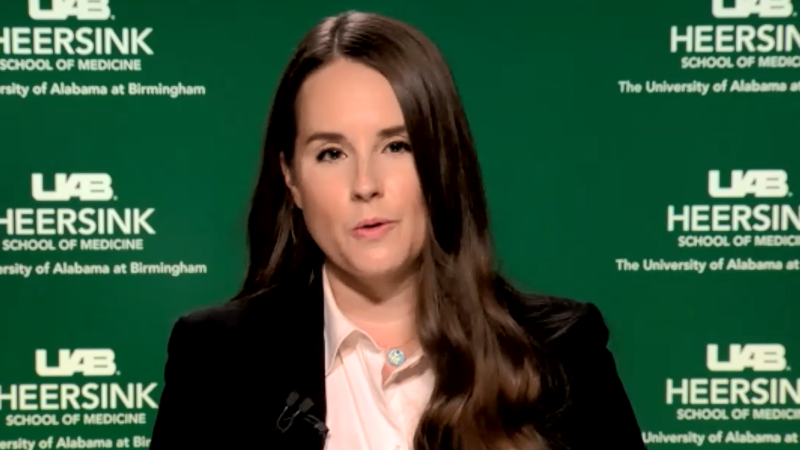Feeling angry? You’re not alone. A UAB psychologist offers 5 ways to deal with pandemic anger
At the University of Alabama at Birmingham, clinical psychologist Megan Hays has seen many difficult emotions as the pandemic drones on. The one that stood out to her the most was anger.
“We all thought that we would be in a different place by this point in the pandemic, 18 months in, and there’s just a general frustration that this is still happening and we are still having to deal with so many losses,” Hays said in a wide-ranging chat with reporters.
She said not only did she notice people experiencing those frustrations, she also noticed that people often judge themselves for feeling those feelings.
“I kind of phrase it as you’re adding a layer of suffering to pain that is inevitable,” she said. “A lot of us are in pain. You don’t have to add that layer of suffering to yourself.”
There are long-term health effects of uncontrolled anger, including increased risk of hypertension, worse pain management, increased anxiety, weakened immune system and headache.
Hays suggested five ways for managing pandemic anger:
Realize it is OK, and even useful, to be angry
It is important to acknowledge the emotion as a valid response to the situation with COVID.
“It’s something new for all of us, and it is just dragging on. Let’s just validate that anger is a normal response to that,” Hays said. “Anger often stems from thoughts that a situation is unfair. And there is a lot about this pandemic that feels unfair.”
Learn to respond to anger, not react
It’s best not to bottle up anger. That can lead to a pressure cooker-like effect where the anger builds up until it is released in unexpected or aggressive ways.
“You try to release all that steam at once or to hold it all in the pressure cooker. Rather, let’s turn down the heat a little bit,” Hays said.
Some ways to do that are breathing exercises, yoga, or meditation.
Don’t dwell on it
After you’ve acknowledged the anger, it’s time to stop ruminating on the incident, news article, social media post or conversation that caused those feelings.
Information overload from social media and “doomscrolling” can also make things worse. Hays suggested when logging onto social media, to have a set purpose of what you want to get out of it.
“[People are] looking for news headlines that confirm already their worst fears and how things are just really bad and getting worse. Look for instead evidence that things could be getting better,” she said.
Practice radical acceptance
Radical acceptance is the habit of accepting that there are things that are out of your control, especially when it comes to the pandemic. Hays said we can ultimately feel worse when we spend too much time thinking that things shouldn’t be the way they are.
“Acceptance does not mean that you’re just holding up your hands in resignation, saying, ‘I’m giving up.’ It doesn’t mean that you’re agreeing with the situation. It’s just saying that you’re choosing to accept what’s out of your control,” she said.
Tell your friends and family how you’re feeling
Telling friends and family how you’re feeling is a proven method of dealing with anger. However, Hays said, if you ask for support, you should be clear about the type of support you need. You should specify whether you want help solving a problem — or someone to just listen.
Hays also acknowledged the specific anger that might come out of conflict with family members this holiday season, especially those with different political opinions.
“I think there’s many different ways that people can cope with this issue,” she said. “You know, I think some people just go ahead and set the boundary right away knowing that if they’re going to be around a family member that has really different views than they do about vaccination, for instance, that that topic will simply be off the table.”
If controversial issues do come up, Hays suggests talking about them from a place of curiosity, trying to have some empathy and understanding why they have the opinions that they do.
Auburn tabs USF’s Alex Golesh as its next coach, replacing Hugh Freeze on the Plains
The 41-year-old Golesh, who was born in Russia and moved to the United State at age 7, is signing a six-year contract that averages more than $7 million annually to replace Hugh Freeze. Freeze was fired in early November after failing to fix Auburn’s offensive issues in three seasons on the Plains.
Alabama Power seeks to delay rate hike for new gas plant amid outcry
The state’s largest utility has proposed delaying the rate increase from its purchase of a $622 million natural gas plant until 2028.
Former U.S. Sen. Doug Jones announces run for Alabama governor
Jones announced his campaign Monday afternoon, hours after filing campaign paperwork with the Secretary of State's Office. His gubernatorial bid could set up a rematch with U.S. Sen. Tommy Tuberville, the Republican who defeated Jones in 2020 and is now running for governor.
Scorching Saturdays: The rising heat threat inside football stadiums
Excessive heat and more frequent medical incidents in Southern college football stadiums could be a warning sign for universities across the country.
The Gulf States Newsroom is hiring an Audio Editor
The Gulf States Newsroom is hiring an Audio Editor to join our award-winning team covering important regional stories across Mississippi, Alabama and Louisiana.
Judge orders new Alabama Senate map after ruling found racial gerrymandering
U.S. District Judge Anna Manasco, appointed by President Donald Trump during his first term, issued the ruling Monday putting a new court-selected map in place for the 2026 and 2030 elections.









